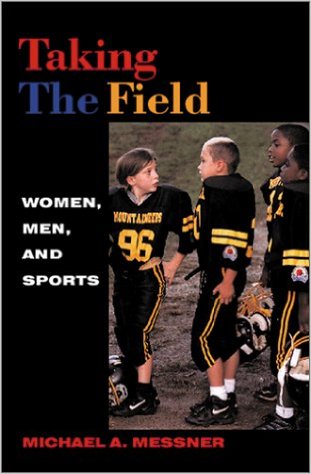《Taking the Field: Women, Men, and Sports》书籍简介:
In the past, when sport simply excluded girls, the equation of males with active athletic power and of females with weakness and passivity seemed to come easily, almost naturally. Now, however, with girls' and women's dramatic movement into sport, the process of exclusion has become a bit subtler, a bit more complicated-and yet, as Michael Messner shows us in this provocative book, no less effective. In Taking the Field, Messner argues that despite profound changes, the world of sport largely retains and continues its longtime conservative role in gender relations.
To explore the current paradoxes of gender in sport, Messner identifies and investigates three levels at which the "center" of sport is constructed: the day-to-day practices of sport participants, the structured rules and hierarchies of sport institutions, and the dominant symbols and belief systems transmitted by the major sports media. Using these insights, he analyzes a moment of gender construction in the lives of four- and five-year-old children at a soccer opening ceremony, the way men's violence is expressed through sport, the interplay of financial interests and dominant men's investment in maintaining the status quo in the face of recent challenges, and the cultural imagery at the core of sport, particularly televised sports. Through these examinations Messner lays bare the practices and ideas that buttress-as well as those that seek to disrupt-the masculine center of sport.
Taking the Field exposes the subtle and not-so-subtle ways in which men and women collectively construct gender through their interactions-interactions contextualized in the institutions and symbols of sport.
Michael A. Messner is professor of sociology and gender studies at the University of Southern California. His previous books include Power at Play: Sports and the Problem of Masculinity (1995) and Politics of Masculinities: Men in Movements (1997).
《Taking the Field: Women, Men, and Sports》读者评论:
Here are a few of the many reasons I keep reading everything Mike Messner writes:
1) He seems to take the feminist "personal is political" slogan to heart, revealing much more of himself and his own questions and vulnerabilities than most other male writers.
2) He uses both academic and journalistic techniques to research his topics and support his theses.
3) He lacks the arrogance of many experts, retaining an open mind as he delibertely attempts to look at things in original ways.
4) The topic of this book -- and several of his others -- continues to fascinate me. By looking at how we "do gender" in a sporting context, we come to understand so much about how and why any and all women and men behave as we do.
Highly recommended. -- Mariah Burton Nelson
USC Sociologist Michael Messner, who has spent the majority of his academic career studying issues of sport, masculinity, and power has written a truly significant book with Taking the Field: Women, Men, and Sports. The book finds a place for much of his previous research, as well as the research of other gender and sport scholars, to elicit the mechanisms in which gender is produced, reproduced, and contested in sport.
The premise of the book holds that gender is a product of structure, culture, and an individual's interactions within culture. This serves as the launching point for a deft discussion of the affects of sport in America. Messner has a talent for seeing the larger picture in seemingly "normal" events, and in Taking the Field he analyzes the affect that "normal" interactions in sport has on the subjugation of women and gay men, and the real and symbolic violence committed against both women and men by men.
Messner's work is important to scholars of both sport and gender, but is particularly important to gender scholars who too frequently fail to recognize the power sport, and sport media, has in shaping current gender relations, particularly the institutionalization of manhood. But Taking the Field is also highly recommend for anybody who has an interest in understanding the larger implications of American sport, beyond winning and losing. It is a must read for coaches, parents, and educators who have anything to do with sport.
To help us understand how theory hits the road, Messner highlights familiar news events such as the Columbine Massacre, or the 1999 Women's World Cup Championships, and analyzes them from a social-feminist perspective. In such he clearly elucidates the perils of the way we do sport in America and shows us that the concepts and theories he speaks of are not just found on the pages of books - that they are real, with real life application, and have a very real affect on people's lives.
Taking the Field is also important because it brings both homophobia and the mediea into the center of analysis. Whereas much attention has been given to the media's role in gender relations, I have been wholly discouraged by the absence of homophobia from much sport literature, and from sport in gender literature. Taking the Field shows the significance homophobia plays in sport, shaping and maintaining athletics as a masculine and heterosexual institution, and how important sport is in the production of gender
In the end Dr. Messner suggests that resistance to the system is possible (perhaps even inevitable). The masculinist center of sport has a soft underbelly and it is currently challenged by individual sports, female athleticism, the growing presence of gay male athleticism, and progressive individual men who are no longer willing to allow the system to function in a homophobic and misogynistic manner. But while these challenges to a hegemonic masculinity have threatened sport's ability to be openly sexist and homophobic, we must understand how sport attempts to reproduce itself covertly, so that we can continue to progress toward a culture of equality...
更多跑步书籍见://www.nduoke.com/running-books
更多跑步书籍下载见://www.nduoke.com/shujixiazai
跑步书籍下载地址合集见://www.nduoke.com/shujixiazai/download
跑步书籍大全附下载://www.nduoke.com/running-books/daquan
跑步书籍推荐合集见://www.nduoke.com/running-books/tuijian
跑步书籍精选书单附下载见://www.nduoke.com/running-books/jingxuan




